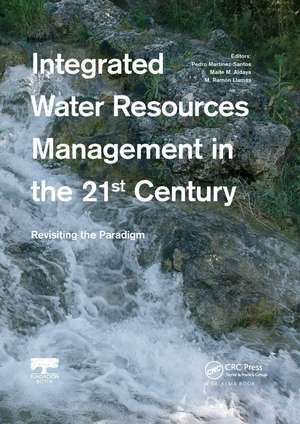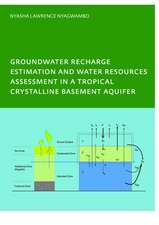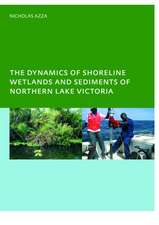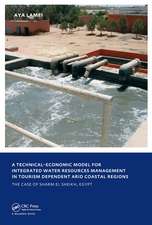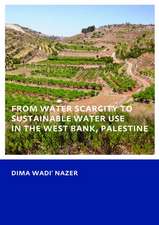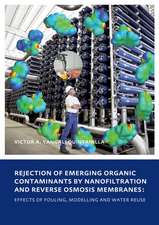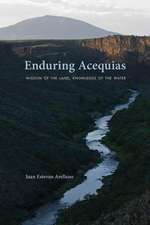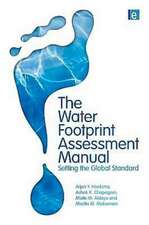Integrated Water Resources Management in the 21st Century: Revisiting the paradigm
Editat de Pedro Martinez-Santos, Maite M. Aldaya, M. Ramón Llamasen Limba Engleză Paperback – 12 iun 2019
| Toate formatele și edițiile | Preț | Express |
|---|---|---|
| Paperback (1) | 435.46 lei 43-57 zile | |
| CRC Press – 12 iun 2019 | 435.46 lei 43-57 zile | |
| Hardback (1) | 1188.26 lei 43-57 zile | |
| CRC Press – 3 mar 2014 | 1188.26 lei 43-57 zile |
Preț: 435.46 lei
Preț vechi: 587.10 lei
-26% Nou
Puncte Express: 653
Preț estimativ în valută:
83.32€ • 87.23$ • 68.95£
83.32€ • 87.23$ • 68.95£
Carte tipărită la comandă
Livrare economică 07-21 aprilie
Preluare comenzi: 021 569.72.76
Specificații
ISBN-13: 9781138071865
ISBN-10: 1138071862
Pagini: 322
Ilustrații: 70
Dimensiuni: 174 x 246 mm
Greutate: 0.86 kg
Ediția:1
Editura: CRC Press
Colecția CRC Press
ISBN-10: 1138071862
Pagini: 322
Ilustrații: 70
Dimensiuni: 174 x 246 mm
Greutate: 0.86 kg
Ediția:1
Editura: CRC Press
Colecția CRC Press
Public țintă
PostgraduateCuprins
Section 1. Introduction and international perspectives: 1. Integrated Water Resources Management (IWRM): The international experience 2. Integrated Water Resources Management: State of the art and the way forward 3. Non-Integrated Water Resources Management 4. Contemporary responses to water management challenges 5. Water policy, agricultural trade and WTO rules Section 2. Integrated Water Resources Management: Lessons learnt in Spain: 6. Virtual water trade, food security and sustainability: Lessons from Latin America and Spain 7. Ten years of the Water Framework Directive in Spain: An overview of the ecological and chemical status of surface water bodies 8. Intensive groundwater use in agriculture and IWRM: An impossible marriage? 9. Future Institutions? On the evolution in Spanish institutions from policy takers to policy makers 10. Urban water, an essential part of Integrated Water Resources Management Section 3. Selected case studies on Integrated Water Resources Management: 11. Integrated water resources in Peru – The long road ahead 12. Integrated water management in Chile 13. Towards IWRM in the upper Guadiana basin, Spain 14. Water resource vulnerability & adaptation management to climate change & human activity in North China 15. Blue water transfer versus virtual water transfer in China – with a focus on the South-North Water Transfer Project 16. The institutional organization of irrigation in Spain and other Mediterranean countries
Notă biografică
Pedro Martínez-Santos is tenured assistant professor at the Universidad Complutense de Madrid, Spain. He obtained his Bachelor of Civil Engineering (Hon) and Master of Technology Management degrees from The University of New South Wales (Sydney, Australia). He completed PhD in Hydrogeology at the Universidad Complutense de Madrid, Spain, where he holds a lecturing post since 2008. He is the co-author of three books and about twenty-five papers in indexed journals, having also tutored two PhD Theses. He has taken part in several international research projects, while collaborating regularly with different private companies and public administrations in the fields of civil engineering and water planning. He has taught several groundwater modeling courses in Spain and Latin America, and served as an international reviewer for research calls from the Argentinian and Romanian governments. Dr. Martínez-Santos currently serves as Technical Director for Geologues Sans Frontières (Geologists Without Borders, Spanish Chapter), a non-profit organization committed to promoting economic growth and alleviating poverty by granting access to safe water and sanitation in developing regions.
Maite Aldaya is a postdoctoral researcher at the Water Observatory and consultant for the Sustainable Consumption and Production Branch of the Division of Technology, Industry and Economics of the United Nations Environment Programme. Maite has a PhD in Ecology and MSc in Environmental Policy and Regulation from the London School of Economics and Political Science. She has worked in several international organizations such as the Agriculture and Soil Unit of the European Commission or the Land and Water Development Division of the Food and Agriculture Organization of the United Nations. She has developed her research on water accounting, footprint and efficiency at different organizations, such as the University of Twente (Netherlands), Complutense University of Madrid (Spain) or Technical University of Madrid (Spain).
Ramón Llamas is an Emeritus Professor from the Complutense University of Madrid, Spain, and a Member of the Royal Academy of Science. He has published more than 100 books and case studies and over 300 articles in scientific magazines. Professor Ramón Llamas has two PhDs in civil engineering and geology from the Complutense and Polytechnic Universities of Madrid, respectively. In 1972 he became the first professor of Hydrogeology in Spain. He held the position of Chairman of the International Association of Hydrogeologists and coordinator of the work group on Ethics in the Use of Water Resources. He has also worked as the Director of the Botín Foundation´s Groundwater Project, which was completed in March 2003 and oficially presented in Osaka (Japan) at the 3rd World Water Forum. He currently presides the Botín Foundation Water Observatory.
Maite Aldaya is a postdoctoral researcher at the Water Observatory and consultant for the Sustainable Consumption and Production Branch of the Division of Technology, Industry and Economics of the United Nations Environment Programme. Maite has a PhD in Ecology and MSc in Environmental Policy and Regulation from the London School of Economics and Political Science. She has worked in several international organizations such as the Agriculture and Soil Unit of the European Commission or the Land and Water Development Division of the Food and Agriculture Organization of the United Nations. She has developed her research on water accounting, footprint and efficiency at different organizations, such as the University of Twente (Netherlands), Complutense University of Madrid (Spain) or Technical University of Madrid (Spain).
Ramón Llamas is an Emeritus Professor from the Complutense University of Madrid, Spain, and a Member of the Royal Academy of Science. He has published more than 100 books and case studies and over 300 articles in scientific magazines. Professor Ramón Llamas has two PhDs in civil engineering and geology from the Complutense and Polytechnic Universities of Madrid, respectively. In 1972 he became the first professor of Hydrogeology in Spain. He held the position of Chairman of the International Association of Hydrogeologists and coordinator of the work group on Ethics in the Use of Water Resources. He has also worked as the Director of the Botín Foundation´s Groundwater Project, which was completed in March 2003 and oficially presented in Osaka (Japan) at the 3rd World Water Forum. He currently presides the Botín Foundation Water Observatory.
Descriere
This book provides a down-to-earth approach to the elusive concept of integrated water resources management, drawing from conceptual frameworks and real-life practice to identify the key aspects that are yet to be resolved. Integrated water resources management (IWRM) advocates a coordinated approach for managing water resources in a way that balances social and economic needs with care for nature. While attractive, IWRM is both controversial and elusive. Critics argue that IWRM is too vague a concept to be meaningful, and that it lacks a sufficiently coherent series of steps leading to its implementation.
Drawing from theoretical frameworks and relevant case studies, this book examines the role of water accounting, food trade, environmental externalities and intangible values as key aspects whose resolution will help the IWRM community move forward.
Drawing from theoretical frameworks and relevant case studies, this book examines the role of water accounting, food trade, environmental externalities and intangible values as key aspects whose resolution will help the IWRM community move forward.
